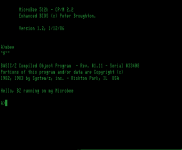I'm always interested in old software because it gives me a chance to maybe add some definitions to my
TrID file identifier, so I started looking around. Since searching for "basic/z" didn't come up with anything useful, I looked at the manual in search of some tools/commands names. Searching for "BZ.OVL", "RZ.COM", etc. got me on the SEBHC pages, but the present version was somehow different from the cached one referenced by Google. So I looked into that, got the images name, downloaded all the archive parts, and found they were still there.
BTW, I first noticed your post yesterday on the PowerBASIC forums. And that indeed was entirely by accident, because while I was often there in the past, it has been some years since the last time I even loaded the pages!



